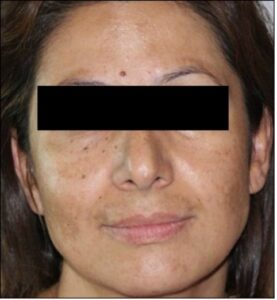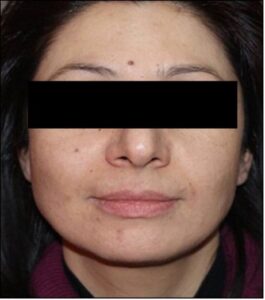Some exposure to the sun is necessary; it helps us produce vitamin D and build stronger bones. Sunlight has even been thought to increase the brain’s release of serotonin. However, unprotected, and excessive exposure to the sun and its ultraviolent (UV) rays can cause damage to the skin and eyes, in addition to cancer and premature aging.
In most cases, ultraviolet rays react with melanin. This is the first defense against the sun. Melanin absorbs the harmful UV rays that can cause serious damage to your skin. A sunburn develops when the amount of UV damage exceeds the protection that the skin’s melanin can provide. A suntan represents the skin’s response to injury from the sun. The best way to protect yourself against the damaging effects of the sun is to limit exposure and protect your skin. The best ways to do this include:
- Generously apply a broad-spectrum water-resistant sunscreen with an SPF (Sun Protection Factor) of at least 30 to all exposed skin. Re-apply about every 2 hours and after swimming or sweating.
- Wear protective clothing such as a long-sleeved shirt, pants, a wide-brimmed hat, and sunglasses, whenever possible.
- Seek shade when appropriate. Remember that the sun’s rays are strongest between 10 a.m. and 4 p.m. If your shadow is shorter than you are, seek shade.
- Protect your lips with lip balm with at least SPF 15.
Preventive measures like those listed above can reduce the risks of cancers, premature aging of the skin, the development of cataracts, and other harmful effects. Examine your skin over your entire body on a regular basis. If you notice anything changing, growing, or bleeding on your skin, see a healthcare provider right away. Skin cancer is very treatable when caught early.
If your patients are experiencing skin damage from sun exposure such as melasma, platelet-rich plasma (PRP) treatment may be an effective remedy.
PRP is commonly used in dermatology and plastic surgery, especially for treating chronic wounds, ulcers, and burns. In recent years, PRP has also started to be used in the field of cosmetology1. Volumetric filling, skin rejuvenation, acne scars, and alopecia are the main targets of PRP application in cosmetology1. This study from the Annals of Dermatology examines the regression of melasma with PRP treatment. The study was performed on a 27-year-old woman who presented with epidermal hyperpigmentation over the cheeks, perioral region, and forehead for about 5 years. The study states,
“Treatment was initiated and her face was injected with autologous PRP…At the end of the third session of PRP treatment, >80% reduction in epidermal hyperpigmentation was observed. At the end of the third session of PRP treatment, >80% reduction in epidermal hyperpigmentation was observed…We did not provide any other treatment or post treatment care besides prescribing the use of a sunscreen product. There has been no recurrence of melasma for 6 months now.”


Figure 1: Hyperpigmentation over the Figure 2: Significant regression
cheeks, perioral region, and forehead. epidermal hyperpigmentation.
Juventix Regenerative Medical® offers practitioners a unique business opportunity in the regenerative medical industry through a low set-up cost and high-margin approach to the application of Platelet Rich Plasma. This treatment is 100% autologous with zero side effects that can aid healing for a variety of conditions, including that of ED. Expand your patient base with PRP to also include the following: pain management, sports injury, cosmetic rejuvenation, hair restoration, and sexual rejuvenation with the P-Shot®!
To purchase or learn more about our FDA cleared PRP products and medical supplies, please visit our website www.juventix.com or call us at (866) 693- 4777.
Sources
- https://www.healthline.com/health/depression/benefits-sunlight#_noHeaderPrefixedContent
- https://www.hopkinsmedicine.org/health/wellness-and-prevention/sun-safety
- https://www.ncbi.nlm.nih.gov/pmc/articles/PMC4069656/
Legal Disclaimer: The information contained in this article is provided for informational purposes only and should not be construed as medical or legal advice on any subject matter. You should not act or refrain from acting on the basis of any content included in this site without seeking medical, legal or other professional advice. The contents of this site contain general information and may not reflect current legal developments or address your situation. We disclaim all liability for actions you take or fail to take based on any content of this article.







